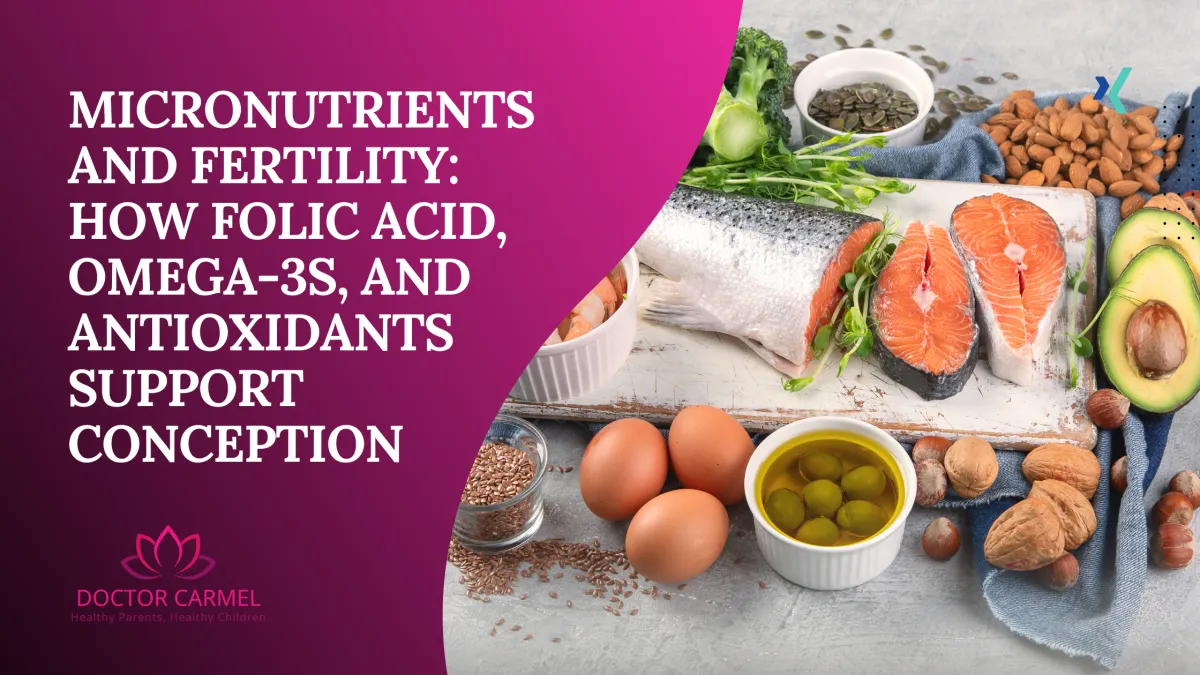
New Blog PMicronutrients and Fertility: How Folic Acid, Omega-3s, and Antioxidants Support Conceptionost
Fertility isn’t just about hormones and cycles—it’s deeply tied to the nourishment your body receives. While macronutrients like proteins and fats get much of the spotlight, it’s often the micronutrients—vitamins, minerals, and phytonutrients—that quietly play powerful roles in your ability to conceive.
Today, we’re diving into three key micronutrients that research consistently links with improved fertility outcomes for both men and women: folic acid (B9), omega-3 fatty acids, and antioxidants.
Why Micronutrients Matter for Fertility
Micronutrients support every stage of the reproductive process—from hormone synthesis and egg quality to sperm motility and embryo development. Deficiencies in even one micronutrient can throw off the delicate hormonal dance that governs fertility.
Modern diets, chronic stress, poor soil quality, and gut health issues can all deplete micronutrient stores, making targeted preconception support more important than ever.
1. Folic Acid: More Than Just a Prenatal Essential
Folic acid (the synthetic form of folate) is best known for preventing neural tube defects in pregnancy. But its importance starts before conception.
For Women:
Supports ovulation and egg maturation
Assists in DNA synthesis and repair—crucial for healthy embryo development
Reduces the risk of chromosomal abnormalities in eggs
For Men:
Studies show higher folate levels improve sperm count and motility
May reduce sperm DNA fragmentation, leading to better fertilization rates
Tip: Consider taking methylfolate (the active form) if you have MTHFR gene variants, which affect folic acid metabolism. If you are not sure, reach out to me for support in testing.
2. Omega-3 Fatty Acids: Fertility’s Anti-Inflammatory Powerhouses
Omega-3s, particularly EPA and DHA, are essential fats that the body cannot produce on its own. Their anti-inflammatory effects are especially important in reproductive health.
For Women:
Supports cervical mucus production
Promotes blood flow to reproductive organs
Reduces inflammation, which can improve conditions like endometriosis and PCOS
Enhances egg quality and implantation rates
For Men:
Boosts sperm membrane fluidity, which helps sperm swim effectively
Increases sperm count and morphology (shape)
May reduce oxidative stress in the testes
Sources: Wild-caught fatty fish (salmon, sardines), flaxseeds, walnuts, chia seed, and high-quality fish oil supplements.
3. Antioxidants: Protecting Eggs and Sperm from Oxidative Stress
Oxidative stress is one of the biggest silent threats to fertility. It damages sperm and egg DNA, reducing viability and increasing miscarriage risk.
Key Antioxidants for Fertility:
Vitamin C: Protects sperm from oxidative damage and improves motility
Vitamin E: Enhances egg and sperm quality
Zinc: Crucial for sperm formation and hormone balance
Selenium: Important for sperm structure and thyroid function
CoQ10: Especially helpful for egg quality in women over 35
Did you know? The ovary is one of the most oxidative-stress-sensitive organs in the body.
Supporting Micronutrient Levels Naturally
You can support optimal fertility by eating a varied, whole-food diet rich in colorful vegetables, high-quality fats, clean proteins, and minimally processed grains.
However, modern demands and environmental exposures often make targeted supplementation necessary—especially during preconception, a time when your nutritional needs are elevated.
Final Thoughts: Your Fertility Is Nourishable
The body wants to conceive—it’s wired for it. But it needs the right building blocks. Micronutrients like folic acid, omega-3 fatty acids, and antioxidants aren’t just helpful; they’re essential for building healthy eggs, sperm, and future babies.
If you’re trying to conceive, it’s worth evaluating your micronutrient status with a practitioner trained in functional or integrative fertility care. Personalized guidance can help you fill in the nutritional gaps and prepare your body to welcome life.
Ready to take the next step?
If you’re interested in optimizing your fertility through nutrition, I invite you to book a preconception consultation or join my Fertility Foundations Program—a holistic, practitioner-guided journey to prime your body and mind for creating healthy babies.
Your fertility journey starts with nourishment.
